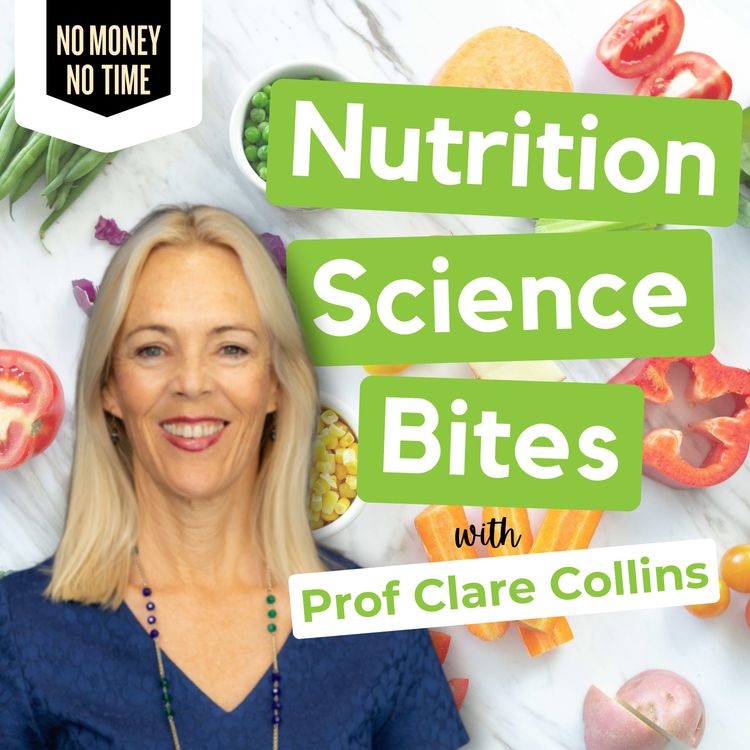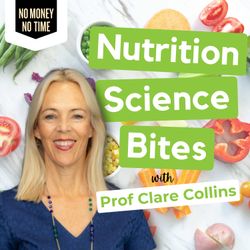Share

Nutrition Science Bites with Prof Clare Collins
Why is everyone Vitamin D deficient? with Dr Ellie Dunlop
Season 1, Ep. 19
•
In this Nutrition Science Bites episode Dr Ellie Dunlop discusses the critical role of vitamin D in health, particularly in Australia where a one in four people are vitamin D deficient. Our discussion covers the importance of vitamin D for bone health, the challenges of obtaining sufficient levels through sunlight and diet, and the need for potential fortification strategies. Ellie shares insights from her research on vitamin D status in various population groups and emphasizes the importance of awareness and proactive measures to improve vitamin D intake.
Here is a link to the Cancer Council Sun Smart App information regarding UV radiation https://www.sunsmart.com.au/resources/sunsmart-app
More episodes
View all episodes

23. Why are women, kids and teens commonly iron deficient? with Associate Professor Amanda Patterson
36:23||Season 1, Ep. 23I chat with Associate Professor Amanda Patterson about the complexities of iron deficiency and anemia, particularly in women. Amanda explains the differences between iron deficiency and anemia, the causes of iron deficiency, and the types of iron found in food. The conversation also covers symptoms, diagnosis, and the consequences of untreated iron deficiency, especially in children. We discuss the importance of dietary strategies and supplements for treatment and maintaining iron levels, while also sharing personal insights and a family recipe.
22. Wholegrains? Should you eat or avoid them? with Professor Eleanor Beck
34:04||Season 1, Ep. 22In this episode of Nutrition Science Bites, I talk with Professor Eleanor Beck about the importance of whole grains and their health benefits. Prof Beck explains the difference between whole grains, refined grains, and challenges of getting information about them from food labels. We talk about practical tips for selecting various types of wholegrain products, including ancient and lesser-known varieties and how to include more in your daily eating patterns. The conversation also covers wholegrains and risk of chronic diseases such as diabetes and heart disease.
21. What if hospital patients could get 'room service' instead of hospital food? with Sally McCray
42:22||Season 1, Ep. 21Who could have guessed that 'hospital food' could be so interesting! In this episode of Nutrition Science Bites, I talk with Sally McCray, a dietitian leading an innovative food service program at the Mater Hospital Group, Queensland. We discuss implementation of a patient-centered 'room service' model in hospitals, its operational challenges, and the positive impact on patient satisfaction, nutrition outcomes, food waste and cost. Sally shares research findings that demonstrate the importance of food as a critical component of patient care. In this conversation, we discuss the complexities of hospital nutrition, focusing on the importance of patient-centered care, the role of data analytics in nutritional assessment, and the impact of innovative food service models on patient satisfaction and health outcomes. We share some personal stories and a Mater recipe from Luke Mangan.Find Sally's Mater Zucchini and Basil soup by Luke Mangan HEREFollow Sally McCray on LinkedIn and Instagram @sally.mccray1Follow Luke Mangan on LinkedIn and Instagram @lukemanganFollow the Mater on LinkedIn and Instagram @materqld The podcast is on the NMNT site here https://nomoneynotime.com.au/ebooks-meal-plans-more/nutrition-science-bites-with-prof-clare-collins-and-guest-sally-mccray
20. Food, nutrition, your microbiome and health with Dr Heidi Staudacher
47:14||Season 1, Ep. 20In this episode of Nutrition Science Bites Prof Clare Collins discusses the microbiome and its role in digestion and overall health with guest D. Heidi Staudacher. Heidi explains the importance of short-chain fatty acids produced by gut bacteria, dietary fiber and the impact of dietary choices on gut health for microbiome diversity. The conversation also covers the impact of medications, particularly antibiotics, on gut health as well as irritable bowel syndrome (IBS) and its relationship with the microbiome. We discuss the intricacies of the Low FODMAP diet and particularly in individuals with IBS and the three phases of the Low FODMAP diet and its effects on the microbiome. The conversation also explores the Mediterranean diet's potential benefits for mental health and its feasibility for people IBS. Research findings indicate that dietary interventions can lead to improvements in both gut and mental health, emphasizing the need for further studies in this area.Check out Heidi's favourite Spag Bol recipe at No Money No Time https://nomoneynotime.com.au/healthy-easy-recipes/15-minute-vegan-lentil-bolognese
18. What is the Purple Food Diet ? with Professor Karen Charlton
35:22||Season 1, Ep. 18In this episode of Nutrition Science Bites, prof Clare Collins discusses the Purple Diet with it's creator Professor Karen Charlton. The Purple Food Diet emphasizes the consumption of purple, blue, and red foods rich in anthocyanins. The conversation explores the origins of the diet, the scientific studies conducted on cherry juice and Queen Garnet plums, and their effects on cognitive health and inflammation. Despite some disappointing results in trials, the overall message encourages the inclusion of colorful foods in the diet for better brain health.
17. How to Improve Nutrition in Aged Care! with Dr Cherie Hugo
36:11||Season 1, Ep. 17In this episode of Nutrition Science Bites, Prof Clare Collins interviews Dr Cherie Hugo, an accredited practicing dietitian with over 25 years of experience in aged care nutrition. They discuss the critical role of nutrition in enhancing the quality of life for older Australians, the challenges of malnutrition in aged care facilities, and the innovative solutions being implemented through the Lantern Alliance and the Epicure tool. Dr Hugo shares insights on how improving nutrition can lead to major health improvements and better outcomes for residents, emphasizing the importance of engaging families and measuring success in nutrition strategies.
16. Is eating meat and drinking milk really bad for the environment? with Professor Karen Charlton
46:06||Season 1, Ep. 16Professor Karen Charlton is a Professor of Nutrition and Dietetics, the University of Wollongong and an Australian research Council Future Fellow. She is working to develop a sustainable, healthy and equitable food system in the Illawarra, Shoalhaven region of NSW. We talk about food sustainability and the factors that influence the environmental impact of the food we eat and what is the best diet for both human health and the planet.Follow Karen on LinkedIn and TwitterFind Karen's Daughter's Friend's Mum's Chicken Stir-Fry recipe HEREFind information on the Lancet Commission Planetary Health Diet HEREFind information about Iodine HERE
15. What to eat if you have Gestational Diabetes with Dr Nina Meloncelli
42:33||Season 1, Ep. 15Dr Nina Meloncelli is a lived experience researcher and Accredited Practising Dietitian, having had gestational diabetes ( called GDM for short) in both of her pregnancies. We discuss the risk factors for GDM and why some women are more at risk than others. We also talk about the nutritional aspects of managing GDM. Dr Nina is also lead of the Metro North Allied Health Translating Research Into Practice program. She believes the ideal health research partnership involves clinicians and consumers, which is why she works with health professionals to build the capability and capacity to solve clinical problems using evidence-informed models of care. When it comes to food, Nina loves to squeeze as many different types of whole plant foods into her family’s diet to keep their health humming.Follow Nina on LinkedIn here